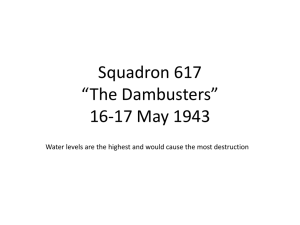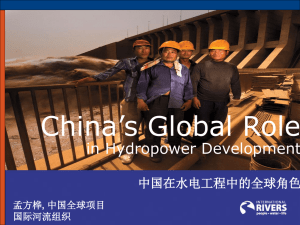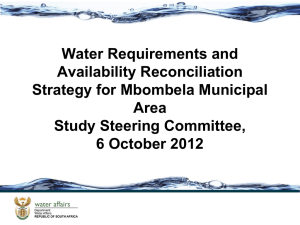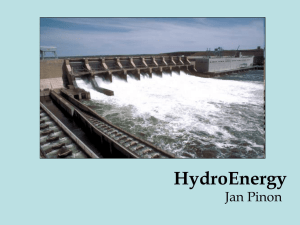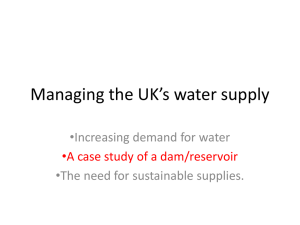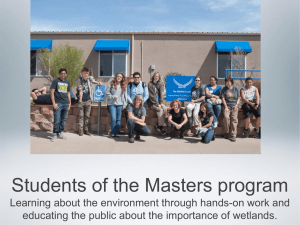Options Increase Water Availability
advertisement
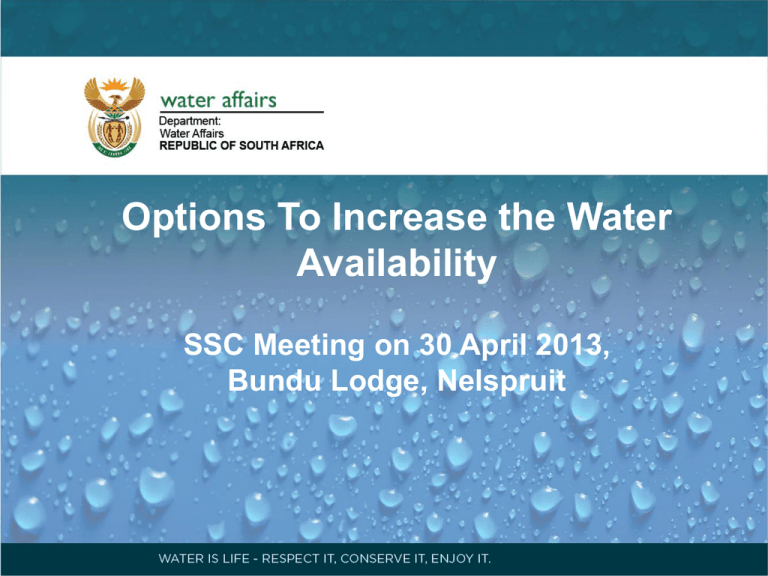
Options To Increase the Water Availability SSC Meeting on 30 April 2013, Bundu Lodge, Nelspruit Options To Increase The Water Availability 1. 2. 3. 4. 5. 6. 7. 8. 9. Removal of Invasive Alien Plants (IAPs) Ground water development System operating rules Eliminating unlawful water use Water reallocation Dam construction Water resource classification Rainwater and fog harvesting Water reuse Options To Increase The Water Availability Removal Of IAPs • Estimated infested area in Kwena Dam catchment - 77 km2 • Estimated infested area in Primkop Dam catchment – 18 km2 • Focus should firstly be on riparian zones. Options To Increase The Water Availability Removal Of IAPs Catchment Stream flow Reduction million m3/a Estimated yield increase due to Removal of IAPs million m3/a Crocodile Upstream Mbombela 17 8 Crocodile within Mbombela 10 1 Sabie Upstream Mbombela 0 0 Sabie within Mbombela 1 0.5 Total 28 9.5 Options To Increase The Water Availability Groundwater Development • Groundwater resource hold opportunities at most of the water demand centres. • Special techniques for Borehole siting are recommended, e . g. ‒ High density airborne Survey. ‒ Radon emanation technique. • Estimated yield increase – approximately 100 000 m3/a – 200 000 m3/a per water demand centre. Options To Increase The Water Availability Areas with High Groundwater Potential Options To Increase The Water Availability Options To Increase The Water Availability System Operating Rules • Real - time operational model for Crocodile River System - limited scope for reducing water losses. • Real - time operational model for Sabie River under development. • Improved systems operations for White River System Klipkopjes, Longmere and Primkop Dams is possible and could increase the yield by at least 1 million m3/a . Options To Increase The Water Availability Eliminating Unlawful Water Use • Extent of unlawful water use in the entire catchment is currently unknown. • Will become known after completion of Validation and Verification Processes. • This option has not been factored into the Water balance as yet, owing to the uncertainties. • Definite possibility and needs to be investigated further, and if possible included in final strategy. Options To Increase The Water Availability Water Reallocation • Full water entitlement can be purchased from interested irrigation farmers. • Needs to be implemented with caution, to avoid social consequences. • Fallow irrigation lands with no farm workers should be targeted. • Water saved through WC/WDM could also be traded. Options To Increase The Water Availability Dam Construction Six dams considered: 0 – 20 million m3/a yield: ‒ Boschjeskop Dam( Nels River) ‒ Ngodwana Dam Raising ( Ngodwana River tributary of Elands River) ‒ Lupelule Dam on a tributary of the Elands River > 50 million m3/a yield: ‒ Montrose Dam - Crocodile River ‒ Mountain View Dam - Kaap River ‒ Strathmore Dam – Revolver Creek. Options To Increase The Water Availability Dams Investigated Options To Increase The Water Availability Dam Construction (Continued) Dam Capacity million m3 Yield million m3/a URV @ 8% R/m3 Boschjeskop 130 20 R 4.50 Ngodwana Raising 100 20 R 19.00 Lupelule 23 7 R 16.50 Mountain View 60 50 R 0.53 Strathmore 60 75 R 0.50 Montrose 210 60 R 4.50 Options To Increase The Water Availability Dam Construction (Continued) • Of the six dams evaluated, two could immediately be discarded on financial grounds, i.e.: – Raising of Ngodwana Dam – Lupelule Dam • Montrose Dam’s URV is relatively high and there will be significant environmental impacts • Three dams remaining to be considered, i.e.: – Boschjeskop Dam – Mountain View Dam – Strathmore Dam Options To Increase The Water Availability Dam Construction (Continued) • If Mountain View or Strathmore dams are chosen, a water exchange needs to be made • Downstream irrigators who currently receive their water from Kwena Dam will now be allocated out of Mountain View or Strathmore Dam • More Kwena Dam water can then be made available to parts of MLM area located upstream of Kaap/Crocodile confluence • Social, financial and environmental implications of such a exchange needs to be investigated Montrose Dam Options To Increase The Water Availability Environmental Screening Criteria Used • Mpumalanga Biodiversity Conservation Plan (MBCP) • National Freshwater Ecological Priority Areas (NFEPA) • Water Quality Impacts • Socio economic impacts Options To Increase The Water Availability Conclusion of Environmental Screening • In summary, the dams which will have the least impact on the surrounding environment would be Mountain View, Strathmore and Boschjeskop Dams. • If social and environmental impacts are taken into consideration, Mountain View Dam and Strathmore Dam would be the preferred options. Options To Increase The Water Availability Water Resource Classification • Sabie River currently in A/B Ecological Category. • If Sabie River Reserve is optimised additional yield may become available. • Subject to full stakeholder engagement process. • This will be part of the resource classification process of DWA. • The Crocodile River situation can also be investigated • The classification project for the whole Inkomati WMA has started Options To Increase The Water Availability Rainwater Harvesting • Rainwater harvesting can reduce the reliance of water users on surface water resources. • It is however not a solution on its own and can only supplement water supplies. • It is estimated that full implementation of rainwater harvesting will reduce the reliance of existing sources by about 5%. • However, rainfall harvesting is not yet competitive in terms of cost. • It is however recommended that municipal bylaws be passed compelling all new housing development to be installed with rainwater harvesting tanks. Options To Increase The Water Availability Fog harvesting • The escarpment to the south of Nelspruit experiences high incidences of fog and there is potential for fog harvesting to supply domestic water needs. • Kaapsehoop could benefit from such a scheme. • However, the amount of water that could be harvested is difficult to determine without a pilot plant. • It is recommended that a pilot plant be constructed at Kaapsehoop. Options To Increase The Water Availability Water reuse • The reuse of water through treating domestic and/or industrial effluent is an option which would reduce the reliance of water users on fresh water sources. • The process is however relatively expensive. • Water reuse is practiced in several towns and cities in South Africa but is mostly applied for industrial and mining use. • The reuse of effluent for domestic purposes is less common. Its an option that is being actively promoted in Durban as a viable reconciliation option but there is some resistance to the concept on cultural grounds. Options To Increase The Water Availability Water reuse (Continued) • In the case of coastal cities and towns which discharge effluent into the sea there is a direct benefit to reuse of effluent. • In the case of inland recycling the benefit is less since the effluent is generally discharged into the river and is already being used by downstream users. • There is no legal requirement for municipalities to return their effluent into the river. They may reuse it if they wish. This could however have implications on downstream users who are already indirectly using this effluent. Options To Increase The Water Availability Discussion
